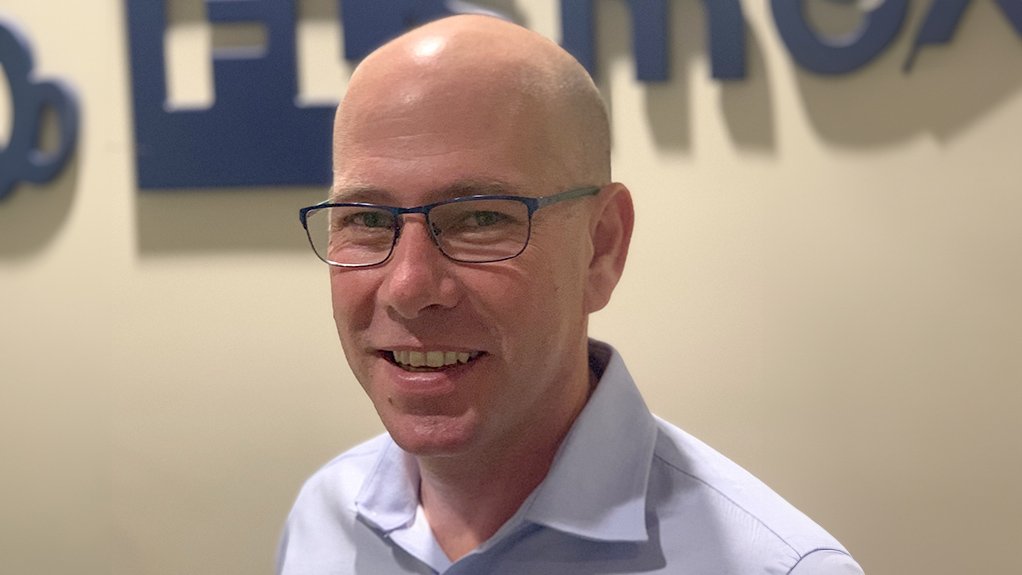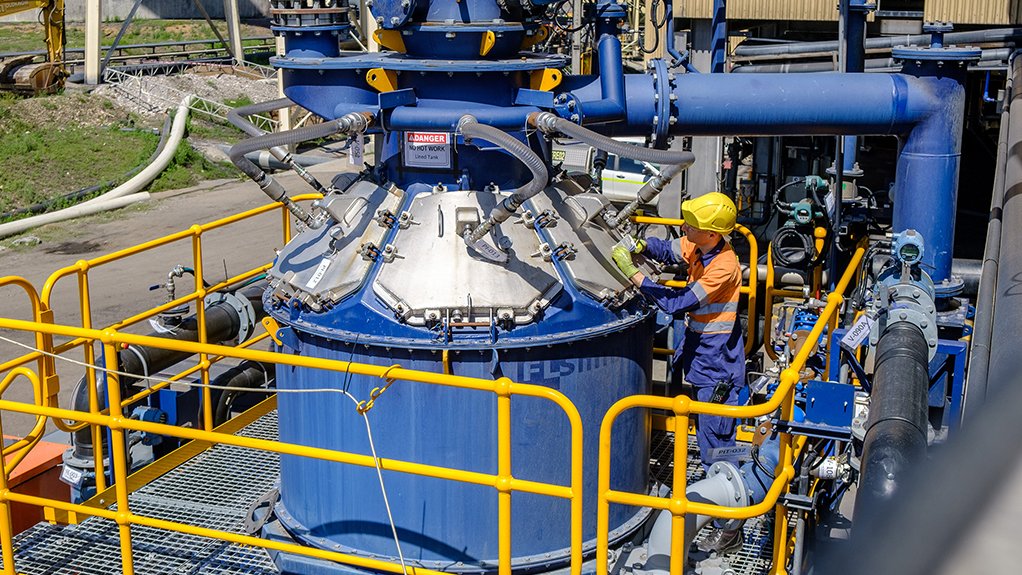Testing backlog as global interest in new flotation tech grows



LANCE CHRISTODOULOU The REFLUX flotation cell presents the South African market with an opportunity to optimise their operations using more compact flotation circuits
RESOURCE OPTIMISATION Because of the shift in the grade recovery curve, the need for additional downstream cleaning stages is reduced, thereby, decreasing water and energy consumption
Global interest in, and the uptake of, the new REFLUX Flotation Cell (RFC) from full flowsheet technology and service supplier FLSmidth has been gaining considerable momentum. As a result of this significant interest, the company is experiencing a backlog in paid-for test programmes at its Salt Lake City facility, in the US, FLSmidth global product director REFLUX technologies Lance Christodoulou tells Mining Weekly.
“We've got customers that are prepared to proceed with the purchase of full-scale equipment to trial in Europe, following the results achieved during lab testing. We are yards ahead in the commercialisation phase compared with where we were when we started two years ago.”
A staged flotation technology, the RFC was officially launched in 2022, and promises higher grades and recovery while reducing processing costs.
“We are taking fundamental steps to enhance collision attachment rates, which improves recovery and kinetics, and washing to increase the grade.
“The RFC is a closed system, while all other flotation technologies on the market are open tank. Therefore, they are limited in terms of the air flux and wash water flux that can be applied. And so, being a frothless system, the RFC can use higher air gas fluxes, and wash water fluxes,” highlights Christodoulou.
The technology enables pre-contacting of feed and air in a high shear rate environment. Consequently, improved collision and attachment rates are promoted, which enhances recovery.
The contacted float mixture is then transported to the main chamber of a separator, where substantially higher air fractions allow for secondary contacting collision and attachments to further enhance recovery.
In addition, inclined channels at the bottom of the device, a unique feature of the RFC, enable extreme bubble liquid segregation, allowing for the separation of the bubbles from the slurry.
“This allows us to operate at higher air fractions of about 40% to 45% by volume. Finally, wash water is used to clean the bubbly overflow mixture, enhancing the grade. As the RFC does not have a defined froth interface, the bubbly mixture that exits is very amenable to washing, further enhancing the grade,” explains Christodoulou.
Years in the Making
The flotation technology has proven its capabilities through various lab-, pilot- and industrial-scale testing over the past five years, says Christodoulou.
The flotation technology was developed by Professor Kevin Galvin, the director of the Centre for Critical Minerals and Urban Mining at the University of Newcastle, in Australia. While FLSmidth is the commercialisation partner of the technology, Galvin has performed a significant amount of lab and pilot testing to vet the metallurgical performance of the technology. This is in addition to a full-scale trial on coal in Australia, where the results mirrored that of lab- and pilot-scale testing.
FLSmidth is also nearing the completion of a three-year project, funded by a grant from the European Institute of Innovation and Technology’s raw materials arm, that is focused on upscaling the RFC technology.
Following lab and pilot-scale testing, the company is currently conducting full-scale trials on a copper concentrator in Poland. As with the Australian trial, the lab- and pilot-scale test results were replicated, if not exceeded, during this full-scale trial, where high grade and recovery rates have been achieved, reveals Christodoulou.
“When comparing the performance of the full-scale machine with that of the pilot-scale machine, we're doing better in terms of the required retention time. Consequently, when we do offer pricing and sizing on commercial units, we will scale up one to one based on the pilot- and lab-scale testing,” he elaborates.
Looking Locally
One of FLSmidth’s claims is that the RFC can be used to achieve higher throughput while reducing energy and water consumption.
The tough local economic conditions being faced by the South African mining industry, in addition to the country’s energy and water constraints and fluctuating global commodity prices, necessitate the evaluation and consideration of technologies that could potentially improve production output, while also reducing inputs.
With a smaller footprint, low energy consumption and better grade and recovery, the REFLUX flotation cell presents the South African market with an opportunity to optimise their operations using more compact flotation circuits, states Christodoulou.
Because of the shift in the grade recovery curve, the need for additional downstream cleaning stages is reduced, thereby decreasing water and energy consumption.
While there is no direct energy input to the cell, Christodoulou explains that, depending on the application and how it is implemented, using the RFC can reduce energy consumption by between 30% and 70%.
“The energy inputs really are isolated to feed and tailings pumping away from the cell. Therefore, it's really more about the reduced energy input needed for materials handling versus the energy input into the machine itself.”
The RFC has also proven to perform well in the recovery of ultrafine material, which could benefit the South African mining industry, specifically platinum production.
Having covered an array of operating conditions through the testing of the RFC, Christodoulou says there is no reason why the results could not be replicated in South Africa.
While no full-scale trials have taken place in the country, FLSmidth is open to the opportunity to conduct full-scale testing locally.
“We have made pilot-scale equipment available to the South African market. Based on the success of the trial, we will either supply an industrial-sized unit, or conduct full-scale testing, if the customer wishes to do so in the coming months,” explains Christodoulou.
Article Enquiry
Email Article
Save Article
Feedback
To advertise email advertising@creamermedia.co.za or click here
Comments
Press Office
Announcements
What's On
Subscribe to improve your user experience...
Option 1 (equivalent of R125 a month):
Receive a weekly copy of Creamer Media's Engineering News & Mining Weekly magazine
(print copy for those in South Africa and e-magazine for those outside of South Africa)
Receive daily email newsletters
Access to full search results
Access archive of magazine back copies
Access to Projects in Progress
Access to ONE Research Report of your choice in PDF format
Option 2 (equivalent of R375 a month):
All benefits from Option 1
PLUS
Access to Creamer Media's Research Channel Africa for ALL Research Reports, in PDF format, on various industrial and mining sectors
including Electricity; Water; Energy Transition; Hydrogen; Roads, Rail and Ports; Coal; Gold; Platinum; Battery Metals; etc.
Already a subscriber?
Forgotten your password?
Receive weekly copy of Creamer Media's Engineering News & Mining Weekly magazine (print copy for those in South Africa and e-magazine for those outside of South Africa)
➕
Recieve daily email newsletters
➕
Access to full search results
➕
Access archive of magazine back copies
➕
Access to Projects in Progress
➕
Access to ONE Research Report of your choice in PDF format
RESEARCH CHANNEL AFRICA
R4500 (equivalent of R375 a month)
SUBSCRIBEAll benefits from Option 1
➕
Access to Creamer Media's Research Channel Africa for ALL Research Reports on various industrial and mining sectors, in PDF format, including on:
Electricity
➕
Water
➕
Energy Transition
➕
Hydrogen
➕
Roads, Rail and Ports
➕
Coal
➕
Gold
➕
Platinum
➕
Battery Metals
➕
etc.
Receive all benefits from Option 1 or Option 2 delivered to numerous people at your company
➕
Multiple User names and Passwords for simultaneous log-ins
➕
Intranet integration access to all in your organisation




















